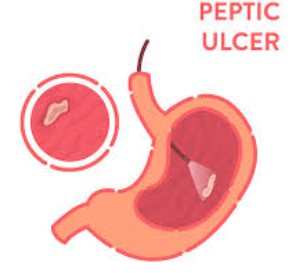Peptic Ulcer Disease (PUD)
Treating Peptic Ulcers for Lasting Comfort

What is Peptic Ulcer Disease (PUD)?
Peptic ulcer disease (PUD) is a condition where open sores develop on the inner lining of the stomach and the upper part of the small intestine. The most common cause of peptic ulcers is the infection with Helicobacter pylori bacteria, and long-term use of nonsteroidal anti-inflammatory drugs (NSAIDs), such as ibuprofen and aspirin. Other factors like smoking, excessive alcohol use, and stress can also contribute to the development of ulcers.
Symptoms
The most common symptom of peptic ulcer disease is stomach pain, abdominal fullness and vomiting with decreased appetite.
Diagnosis
Diagnosis of peptic ulcer disease typically involves:
Upper gastrointestinal (GI) endoscopy with test for h.pylori
Treatment
Treatment of peptic ulcer disease depends on the cause of the ulcers.
Options include:
Antibiotics: To kill H. pylori bacteria if they are the cause.
Proton pump inhibitors (PPIs) and antacids: Drugs that reduce stomach acid to allow healing of the ulcer
Avoiding NSAIDs: If NSAIDs are the cause, stopping them or reducing their use is necessary.
Lifestyle changes such as quitting smoking, limiting alcohol, and avoiding spicy foods can also help manage symptoms and prevent the progression of the disease.
